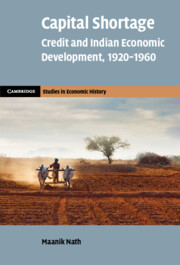Book contents
- Capital Shortage
- Cambridge Studies in Economic History
- Capital Shortage
- Copyright page
- Contents
- Figures
- Tables
- Acknowledgments
- 1 Introduction
- 2 Agriculture, Commerce and Governance in the Longue Durée
- 3 Climate and Credit
- 4 Courts and Credit
- 5 Regulating Moneylenders
- 6 Regulating Cooperatives
- 7 Credit after 1960
- 8 Conclusion
- Epilogue
- Bibliography
- Index
Epilogue
Risk and Regulation across Colonial India
Published online by Cambridge University Press: 08 September 2023
- Capital Shortage
- Cambridge Studies in Economic History
- Capital Shortage
- Copyright page
- Contents
- Figures
- Tables
- Acknowledgments
- 1 Introduction
- 2 Agriculture, Commerce and Governance in the Longue Durée
- 3 Climate and Credit
- 4 Courts and Credit
- 5 Regulating Moneylenders
- 6 Regulating Cooperatives
- 7 Credit after 1960
- 8 Conclusion
- Epilogue
- Bibliography
- Index
Summary
Summary: How applicable are findings from the study of credit markets in Madras to understanding the institutional development of rural finance in other Indian provinces? This chapter provides a brief reflection on the risks that moneylenders faced, and the impact of targeted regulations on the supply of loans, in three major Indian provinces. It outlines lending patterns across Bengal, Bombay and Punjab from 1850 to 1950, and finds that the threat of crop failure, legal delays from slow courts and unintended consequences of misplaced policy interventions had similarly restrictive effects on credit supply across India. Credit regulation came early in Bombay and Punjab, with land alienation laws being introduced in 1879 and 1900, respectively. Whereas the market in Bengal remained unregulated till the 1930s, the persistence of land tenure systems that disadvantaged the occupiers of land accentuated the underlying risks of rural lending throughout colonial rule.
- Type
- Chapter
- Information
- Capital ShortageCredit and Indian Economic Development, 1920–1960, pp. 205 - 216Publisher: Cambridge University PressPrint publication year: 2023



